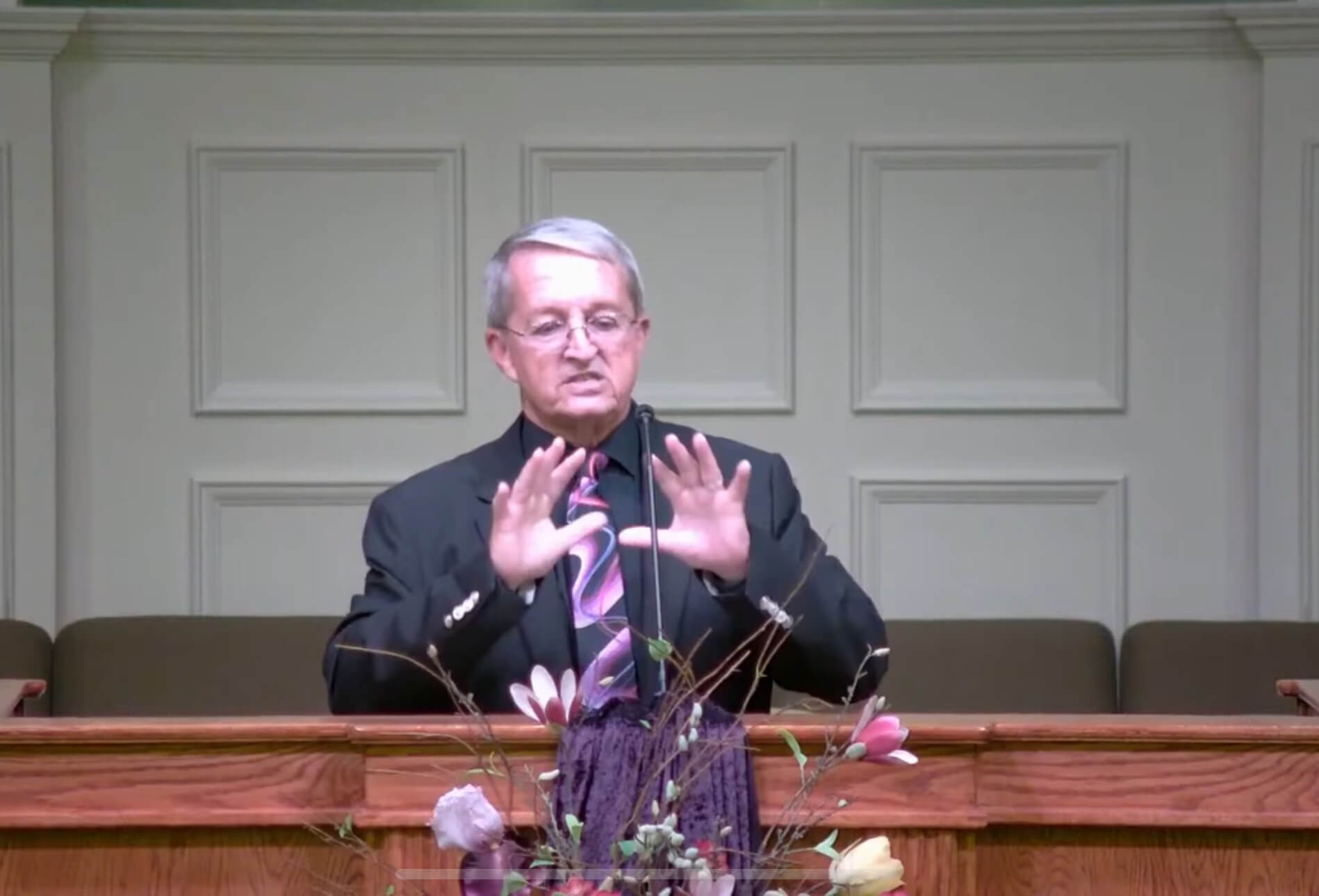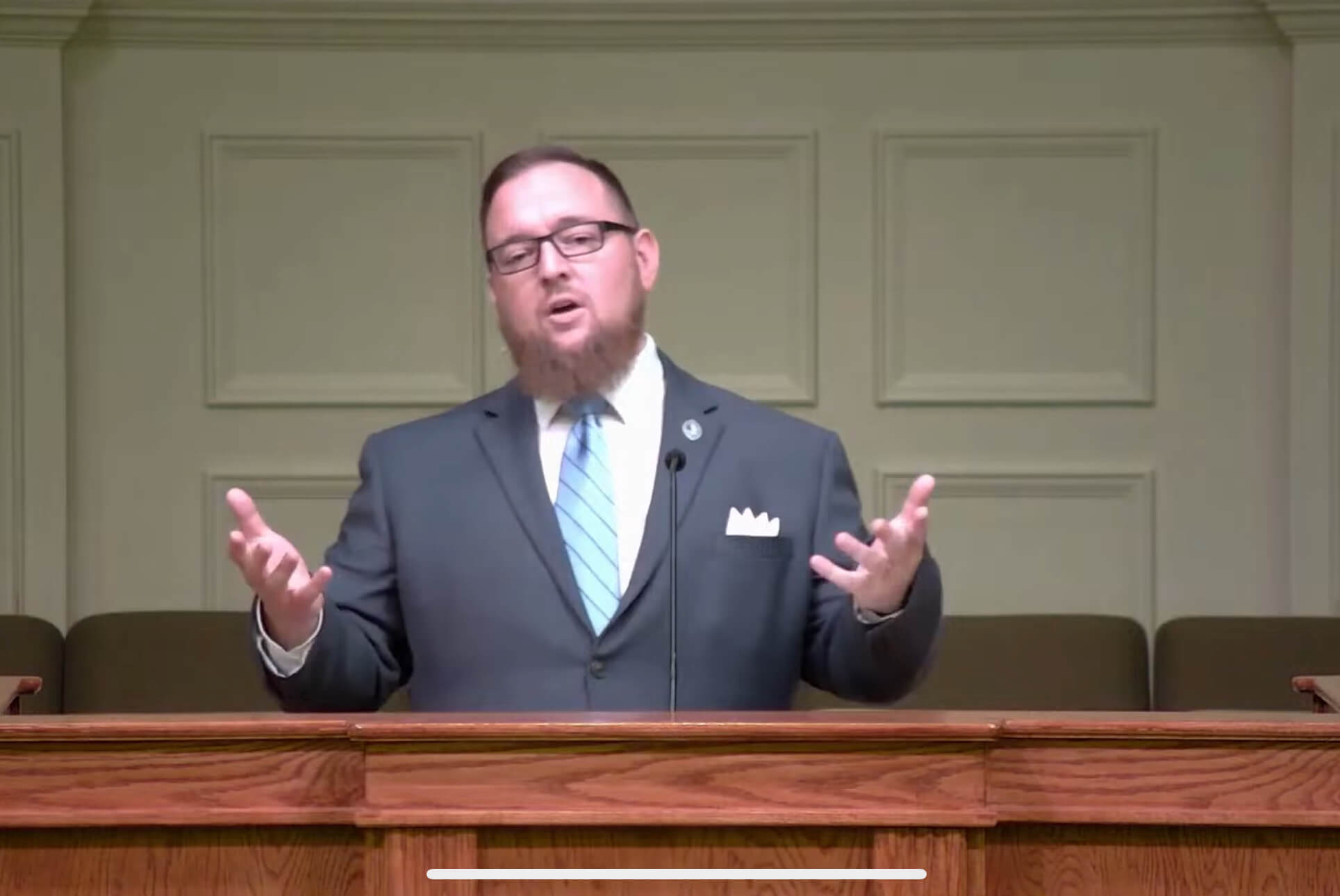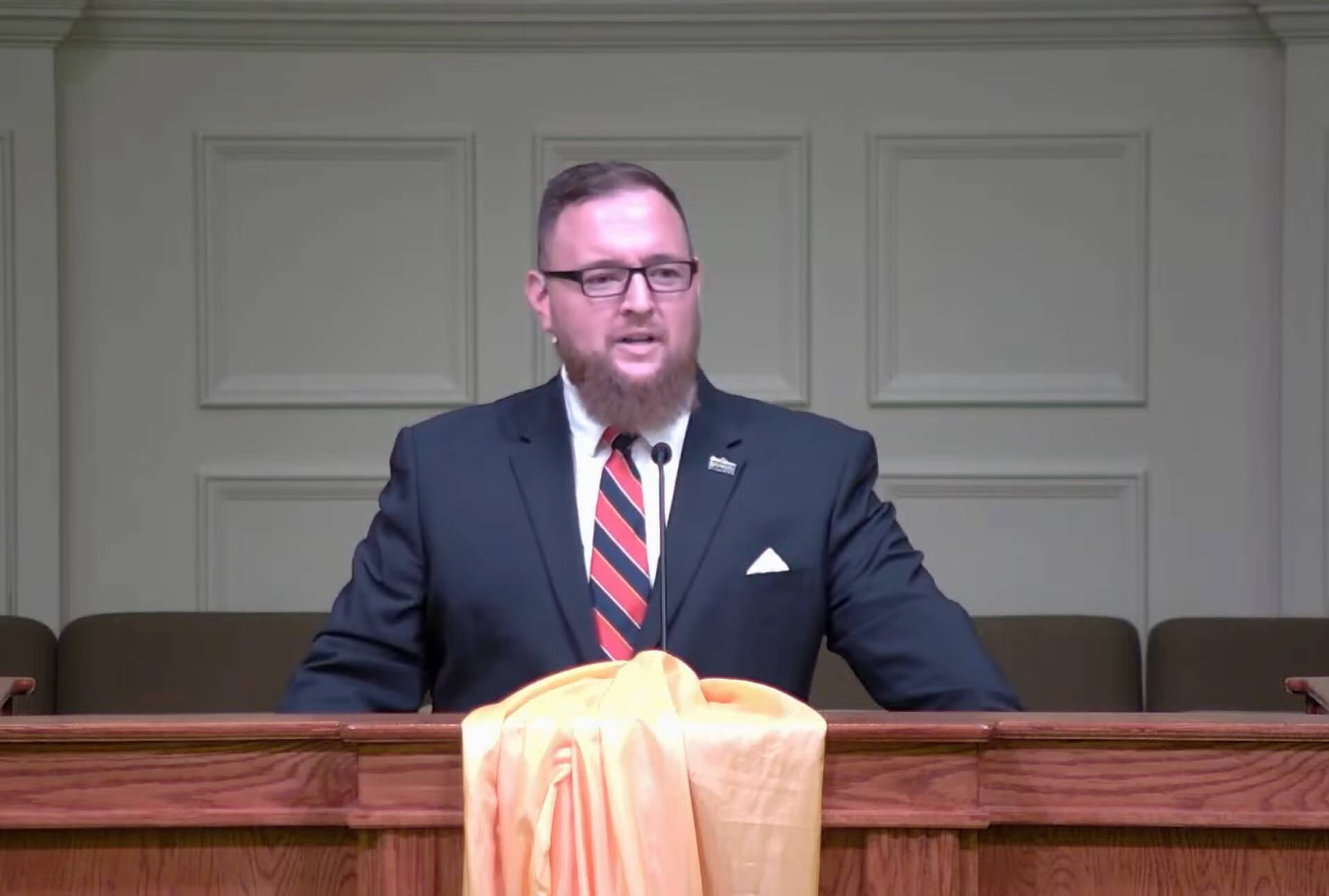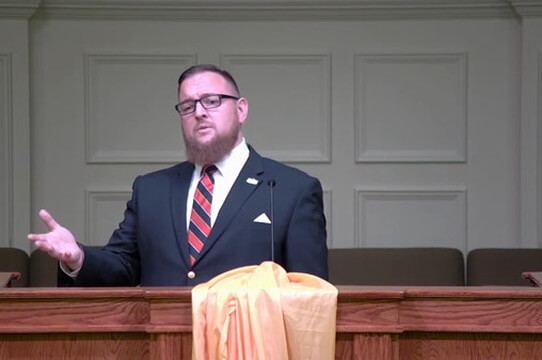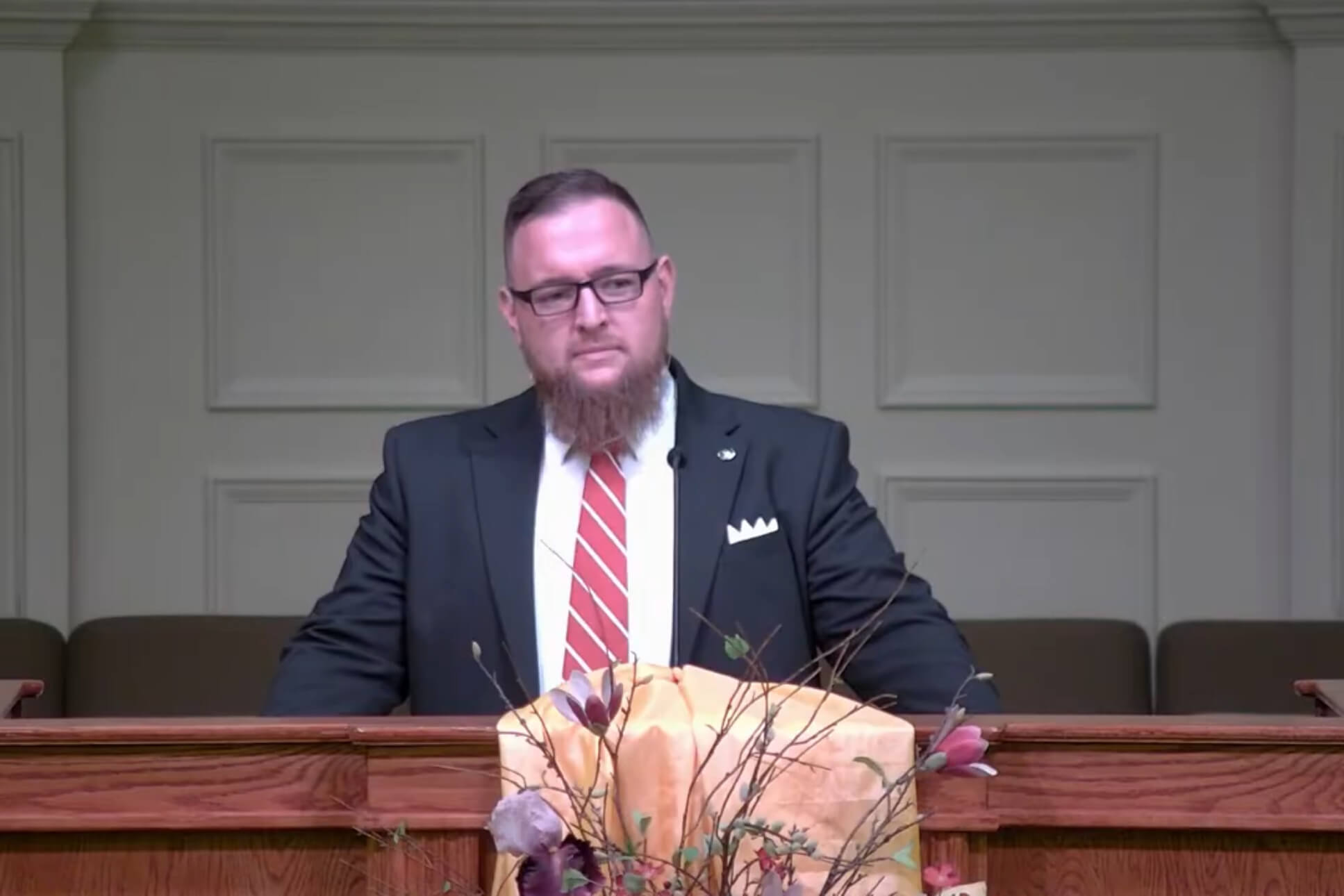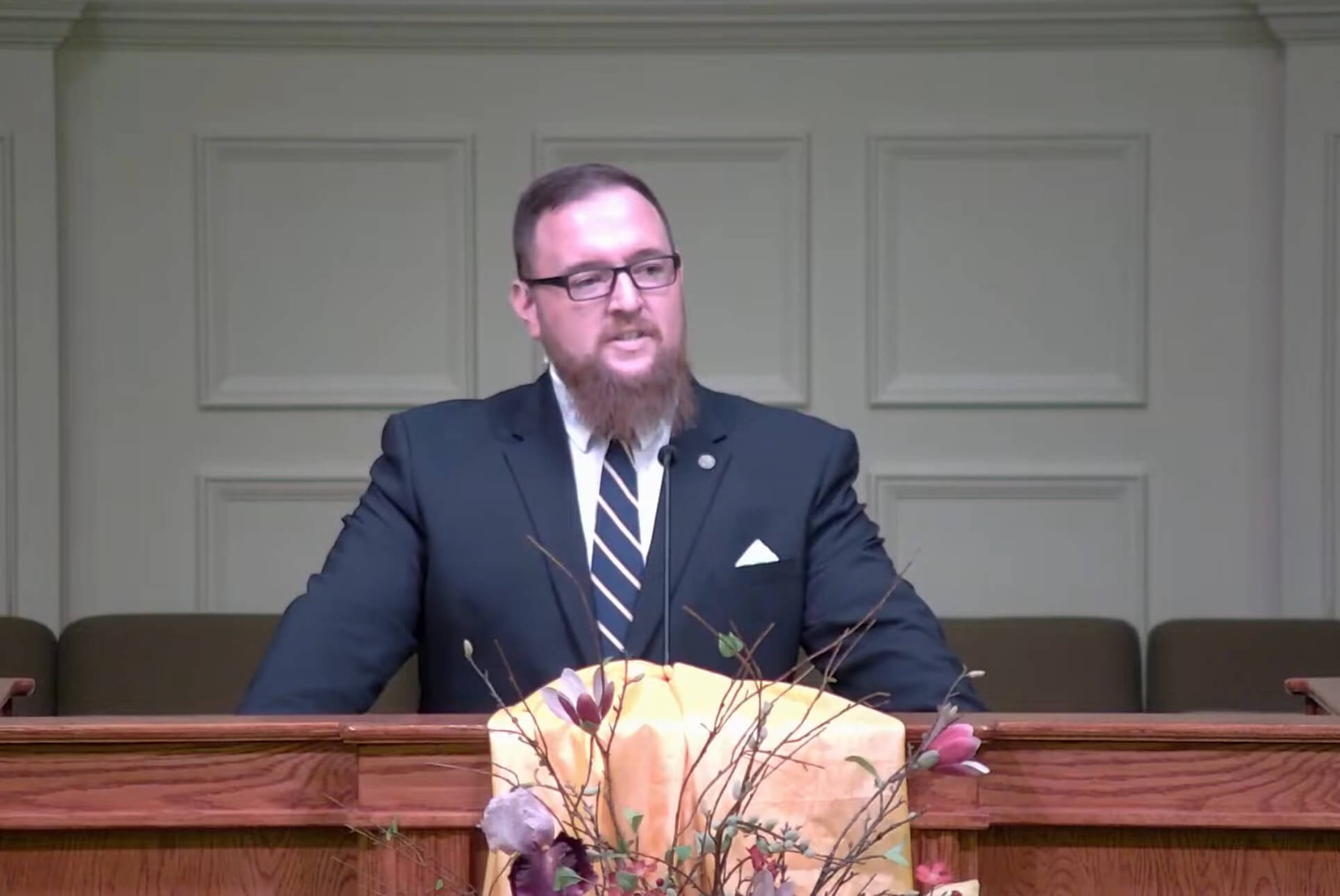Video
“Agony & Confidence”
Matthew 26:36-46; 53-56
Pastor Richard C. Piatt II
04/28/24
Audio
Transcript
Well, this evening, take your copy of God’s holy, inerrant, inspired, sufficient, and authoritative word, and let’s go to Matthew chapter 26. Matthew 26, as you turn there, I do want to explain myself a little bit this morning. There were those that just allow me a lot of grace and latitude in making announcements and so forth, realizing that eventually it’ll all come out. And this morning I did make reference to a couple of families that are within our church that have been touched. By some tragedy tragedy and some things like that this evening. I can give a little bit more of a just a very very quick report.
Concerning that one was that in the midst of my Illnesses and times in the hospital and so forth. I was in there with a buddy who’s here Frank Murphy and we were kind of sharing who was going to have bigger surgeries and what was going to happen and all of that and and And he is a glutton for my punishment, and so he had asked me in the midst of some of those times to pay a visit to one of his neighbors who was in the hospital. And her name is Wands Winnicus, and she has cancer and is quite ill. And so I did go visit her and spend some time with her. And so I was able to minister to her. But in the midst of her journey right now on cancer, her husband died. And so it was very, very bad. And so we’re going to do our best to try to continue to minister to her and to that family and to do what we can in that.
And so that was one, but the other one was that also I received this morning at 10 something a.m. that as a text from Adam Gibson, our missionary in Portugal. And that text came as he was announcing, but we weren’t really sure how much that we should go public or just what, but to pray. And some of you know the Smith family, Chuck and Elsie are kind of the patriarchs of that family, then Phil and Bonnie, who used to be members here, and their children. And one of their sons, Andy, is married and has a wife who was expecting a child, and that this past week she delivered that child by way of Caesarean section. But they knew that there were some some issues that were going on there and that child did pass away and so we have so pray for Andy Smith and his wife and for I think the way you say it that is honey, correct and To pray for honey the wife that she was able to hold the child but the child did pass away and so we’re just heartbroken for the family, to lose a child but to lose one right after birth and to go that time, it’s just a very tragedy type thing.
Then also this week in the midst of all of that is when we will have the Kincaid funeral on Saturday as we minister to them. A very tragic time. And so do be in prayer for us as we prepare. I’ll be meeting with Tim this week and planning out that service. Many people from a far away, I won’t say far away, but at least not local, are coming and traveling. And this is a time to really share the gospel. And the focus is gonna be on the Lord Jesus Christ this Saturday at that service. So pray for us as we work on that.
Let’s bow together and pray for these that are hurting and for the ministry of this week. Our Father in heaven, we do commit each of these circumstances to you. Father, those that have been touched by death, there is a sting, there’s always a sting. but yet we do know that the Lord Jesus Christ is the answer and the one who removes the sting of pain and of death. So Father, we just pray that as we have opportunity that we can minister in the name of Christ and to show and to point others to him. So Father, work in and through us in each of these circumstances, minister to the family, as they keep their eyes on you. For we ask these things in Jesus’ name, amen.
Well, in the past three weeks, Pastor Ryan has been going through his series on the Trinity and expounding that very, very difficult thing to do. And if you’ve felt a little bit blown away, that’s good. The sermon this morning on, just to even use the word aseity from the pulpit is a major impact. And then to talk about stuff that you probably felt much of that went over your head, and he keeps calling it the simplicity of God. Well, in a real sense, and I mean this sincerely, The simplicity of God is more complex than all of our brain cells put together because he’s God.
Now, if you wonder how on earth then, you know, why do we consider it and why, you know, why did God reveal so much of that in the scriptures? Well, part of that is to point to the fact of his greatness and our smallness. It’s really that simple. And if you want to know, and I’ve shared this with him, if you want to know basically the summation of it all. I was jokingly going to say, okay, he’s had three sermons, I’m going to correct it all in one. But that would be mean-spirited, and he would understand that that’s a joke. But actually, the way that I keep it straight, and always have, and the way that you can keep it straight, Especially when it comes to with respect to Christ.
And we’re going to look at that again here tonight. That Jesus Christ. Is truly man. And truly God. Others I know I do know that there is a YouTube video with John MacArthur and R.C. Sproul. two great mentors to me, and to most of us, that whether you say truly man, truly God, or if you say something like completely man, or fully man, and fully God, only the theologians are gonna work out those little minute details. And between the two of them, they’ve been, and if you read them, and if you listen to them, even they go back and forth. But it’s basically this, Jesus Christ is completely human, a real man. You cannot get away from the fact that he nursed. He had diapers of that day and age, swaddling clothes. He grew in wisdom. He got smarter. There was addition to the development of his brain cells. He was truly man. We have a high priest. We have a savior who is truly man. And I can identify with him. He’s my savior and he gets me because he’s of me as that sense of part of humanity. He was truly man. Fully man. And yet, He’s also truly God, which is greater to say, take up the bed and walk or your sins are forgiven, but that you may know I have the authority to forgive sins. Only God has that in the ultimate sin. He’s truly God. And if he’s going to save my soul, he’s got to be truly God.
So in the problem, If you want to look at it this way, that God is that is before God to get sinners saved. It’s got to be by someone who is a full man and who is fully God. And that’s basically the crux of the matter when it comes to the relationship of God the Son and God the Father and then the God the Holy Spirit just points to Christ and they’re all put in together and at the baptism all three are there and we can build those cases of which Pastor Ryan did very, very well. Tonight, what I thought I would do, as I listened online last Sunday morning, I thought it was just an excellent thing, and tonight I want to basically, in a real sense, maybe wrap it up by looking at the authenticity of the humanity and the authenticity of the deity of Jesus Christ. And we’re gonna do it from the Gospel of Matthew, and some more glimpses. These last 20 chapters of 26, 27, and 28, we’ve been taking chunks, but going through them. And I’m going to do that again tonight very, very quickly without any deep exposition, but with Lord willing, a deep contemplation of the glimpses that we have here. Charles Haddon Spurgeon said of the sections that we’re going to look at tonight, quote, Here we come to the holy of holies of our Lord’s life on earth. The last three chapters of the gospel of Matthew.
So we come to the holy of holies of our Lord’s life on earth. This is a mystery like that which Moses saw when the bush burned with fire and was not consumed. No man can rightly expound such a passage as this. It is a subject for prayerful, heartbroken meditation, more than for any human language can express. So some of this we just read and you’re in awe. In fact, the last point, I got a feeling that’s about all we’re gonna do and we’ll come back and revisit it in the future. William Barclay said this, surely this is a passage we must approach upon our knees. D.A. Carson said this, quote, as his death was unique, and we would all affirm that, as his death was unique, so also was his anguish. Because that’s what we’re gonna look at tonight. His death was unique and so was his anguish. And our best response to it is hushed worship. So tonight, we want to contemplate upon our knees in hushed contemplation, four glimpses of Jesus Christ, the God-man in his authenticity as a man, 100%, and as God. 100%. And it’s kind of interesting how Matthew does that. I don’t want to take a lot of time for setting context. We can do that. The sermon can stand on its own. But what it is is that hopefully I’ve been able to convey to you how profoundly I have been affected by the scholarship and the writing ability of Matthew in his gospel.
He puts nothing in here by mistake. He puts everything in alignment to ultimately go to the crescendo of the entire passage of the Great Commission, what we call the Great Commission. And that’s where we’re going to actually end up tonight. And so in the four glimpses of Jesus Christ, the God-man in his authenticity, Um, they become quite real. So the first glimpse that we’re going to look at today is the death like sorrowful soul of Jesus Christ. Um, so in this particular passage, take a look at your Bible and look at chapter 26 verse 36. And let me read the passage, um, here. This is the word of the Lord. Then Jesus came with them to a place called Gethsemane. And he said to the disciples, sit here while I go and pray over there. And he took with him Peter and the two sons of Zebedee. And he began, and this is what we want to look at. And he began to be sorrowful and deeply distressed. R.C. Sproul would say that’s in his human nature. This is the man, Christ Jesus. He was sorrowful and deeply distressed, and as if that weren’t enough, and then he said to them, that would be to the three, my soul, my life, me, My soul is exceedingly sorrowful, even to death. Stay here and watch with me. And he went a little further and he fell on his face. And he prayed, saying, oh, my father, If it is possible, let this cup pass from me. Nevertheless, not as I will, but as you will. Well, how many wills are there? There’s one.
But what he was praying about is so repulsive. with the sin of man to be placed upon him and what he’s looking at, the cup what he is about to drink, the dregs, completely. That he is so repulsed that in his humanity there is exceedingly sorrowful death like sorrow in his soul. And then he came to his disciples, found them sleeping, and said to Peter, what, could you not watch with me one hour? Watch and pray, lest you enter into temptation. The spirit indeed is willing, but the flesh is weak. And again, a second time, he went away and he prayed, saying, oh, my father, if this cup cannot pass away from me unless I drink it, your will be done. Now we might say that’s the humanity with the coming alongside now of the deity of Christ and the one will that is there. And he came and found them asleep again for their eyes were heavy. So he left them again and he went away. He prayed the third time saying the same words. Then he came to his disciples and said, are you still sleeping and resting? Behold, the hour is at hand. The son of man is being betrayed into the hands of sinners. Rise, let us be going. See, my betrayer is at hand.
Now, there have been those that have come here and they make the division and they just say, Jesus is only a man. He’s trying to get God to change his mind. Is that really what’s going on here? I think it’s wrapped up back in that other part when it talks about that his soul is sorrowful, deeply distressed, exceedingly sorrowful, even unto death. If we compare, now Matthew did not choose to put all of these things in here, but we have all kinds of other stuff that come in here about while praying he sweats great drops of blood, where capillaries in his brow is breaking, You want to know how much a man can be deeply distressed to the point of popping blood vessels and blood dropping down. Christ was fully man and he was being affected in this way.
Now we can approach this in two different ways. One is to say what this is not. This is not just one of the normal times of prayer. There were those times, I mean, Jesus took the three up to the Mount of Transfiguration and did the same kind of thing in praying and having a major event in Matthew 17. This is not that. That there was the rising or the raising of Jairus’ daughter in Luke chapter 8, not in the Gospel of Matthew, but he took the same three and there was a time of prayer. This is not the time of just a time of prayer because, you know, Judas knew that he would be there and that’s where he knew that he could lead the people there to betray Christ with the kiss that’s going to happen just at the end of this whole thing. That Jesus didn’t have to have this kind of quiet time because he was struggling with the will of God saying, God, I think this is unfair anything. No. He’s fully man, he’s fully God. He knows exactly what is about to happen. And in a real sense, it’s repulsive to him in his sinless state. All of his righteousness, there was no sin that was ever there.
Well, what was this? This is a time to demonstrate his humanity, the authenticity of that humanity. He’s shrinking away from his soul from the wrath of God. I’ve looked at it another way. I don’t think he would have been fully man if he didn’t have this kind of a response. This is what a righteous man does and responds. And this is how he acts. Well, we don’t have, for sake of time, I can’t turn to it, but this whole idea, when he talks about let this cup pass from me, maybe I’ll come back and we will take a look at this, but in Psalm 75, verse eight, there is the cup of God’s wrath, Isaiah 51, 22. It talks about the goblet of the wrath of God. Jeremiah 25, 15 talks about the wine of his wrath. Ezekiel 23, 31 through 34 talks about the cup of the wrath of God and that he would take and drink the dregs of it all. He knew exactly what was coming. Father, if it were possible, this is abhorrent to me. Because he was a real man. He didn’t go around saying, I’m gonna use my deity and I’m gonna fight this off, all right? He’s a man. But it actually gets even worse than that. Because you see, when it says that he began to be sorrowful to death and deeply distressed, my soul is exceedingly sorrowful even to death. The words that are used there are a word that we get in English called the periphery. Christ in knowing this is the night of his betrayal. And he knows it. We saw, we read that, my betrayer is at hand. It’s all happening now. The words he uses is that there’s a periphery of sorrow that has surrounded him. and that the wickedness of all of those that he was dying for that would be placed upon him. He who knew no sin. We can go to other places and see what the New Testament, how it interprets it. He who knew no sin became sin. This is the beginning of the periphery of it all.
The Collins have kind of gotten me into a new hobby of butterflies. And, you know, butterflies, these beautiful things that everybody loves, but they don’t come out that way or they don’t start that way. You know, they lay an egg and then they totally devour milkweed and then they, you know, as caterpillars, and then they climb up to the top of the plant or of the special cages that we’re raising them in, and then they build this chrysalis, and the periphery of this green chrysalis that surrounds them and encases them, and they just turn to, this is what they say on YouTube, just juice, it’s gooey stuff inside, and then eventually this beautiful butterfly comes out of the chrysalis. Well, The part of illustration of this is when the chrysalis was forming around Christ. It was sorrow. It was deep distress, even to the point of death. That is truly a man. Because he knew exactly what was going to happen, but my savior. He’s a man.
But it actually even gets worse. I confirm this, and Matthew doesn’t put it in here, but I confirmed it in the Greek New Testament as I went to the Gospel of Mark chapter 14 and verse 36, the same passage, Mark 14, 36. And up when it says, oh my father, if it is possible, let this cup pass from me. And then, you know, down in verse 42, he says, Oh, my father, if this cup cannot pass from me. But Mark adds just a little bit more. Which really hit home to me. You know, as Christians, we have the ability to pray. We don’t use it like we should, but we can. And the Apostle Paul in Romans chapter eight. He tells us that we can groan and that the Holy Spirit groans with us, with groanings that cannot be uttered, and that as we can pray, and sometimes when you are so overcome and deeply distressed, and you are overwhelmed, what do we say? And you know the phrase, we can go to God, our father, and to call him daddy. Abba, father. Do you know that Mark recorded, and that’s what he says, oh my father, if it is possible. That’s Jesus. crying out to his father, saying, Abba, Abba Father, Daddy, I don’t want to be forsaken of you. I don’t want this terrible wrath to happen, but nevertheless, your will be done. For all eternity, it has been our plan to redeem a people unto yourself, and I will be the Savior. But Daddy, This is pitiful, sorrowful to death. Is there any other way? The answer comes back, no. Your will, that’s what I want. Now that is authenticity to his humanity.
This is not some cold, Calvinistic, sovereign grace kind of doctrine, well, he’s the son of God and he knows what he’s doing. And this is all gonna work out according to the sovereign plan. And this is kind of so good that it’s all gonna work out just like, okay, surah, surah. May God deliver us from that kind of cold-hearted, theology that loses sight of the humanity of my Savior who has to cry out to his daddy. And yet he’d already taught the disciples in three days, I’m gonna die, they’re gonna, you know, and then I’m gonna rise again. It’s all according to the eternal counsels and foreknowledge of God. His plan, it’s all worked out, it’s all there. But my Savior was a man. He was touched in every way like what we are. He gets it when we go through turmoil, heart pain, and the like.
So death-like sorrow of soul is what we have in Christ. The second glimpse that we have is kind of interesting. It’s still in chapter 26, but look on down to verse 50. And we won’t spend as much time on these others, but look at this. This is during the time of the arrest. And Jesus says to Judas, friend, why have you come? And they came and laid hands on him and took him. And suddenly one of those who were with him stretched out his hand and drew a sword and struck the servant high priest and cut off his ear. We know that’s Peter, you know, kind of whacked off and all that. Now, before that happened, if you go over to the Gospel of John, you do know of something else. Jesus said, who are you seeking? And he says, they said, Jesus of Nazareth. And we know what, it’s that odd verse that, you know, Matthew didn’t get caught up in that, but John had to let us have it. And he said, you know, who are you seeking? You know, Jesus of Nazareth. He said, well, I am.
And you know, it’s that funny verse that, you know, I don’t, I really don’t know how to properly interpret it, but we all have fun with it. They all fell down. Like did those words just knock him down? Did they fall down in horror? Well, they got back up and they asked and then he asked him again, showing he’s the one all in control and everything. But it was he had already had this demonstration of his deity, the authenticity of his deity. But we have another one here because Jesus then says. He struck the high servant priest and cut off his ear. And Jesus said to him with a sword, put your sword away, for all who take the sword will perish by the sword. Or do you think that I cannot now pray to my father and he will provide me with more than 12 legions of angels? A legion, 6,012.
So he’s saying, do you not know? Put the sword away. I can say, Father, angels, help. And I’ll wipe them all out. We can take out all of Jerusalem if we want to. 72,000 angels I can actually call. Now, that is a statement of deity. Because first of all, I don’t know how many angels I can call up. I think if I call them up, God would say, you poor soul. You know, like, how could he do that? Because he’s God, he’s fully God.
So he can cry out, Daddy, no, if possible. And then he says he heals him and then he says, I can call for 72000 angels and. We’ll take care of this right now when he says. How then could the scriptures be fulfilled? That it must happen thus. And then he’s gonna say that again. And in that hour, Jesus said to the multitudes, have you come out against me robbers with swords and clubs to take me? I sat daily teaching in the temple and you did not seize me. But for all this was done that the scriptures of the prophets might be fulfilled. Then all the disciples forsook him and fled that the scriptures might be fulfilled. How did he know this would happen this way? Because he’s God.
His deity is authenticated. His deity is authenticated even in the midst, right after the praying, and he authenticated his humanity. Now he authenticates his humanity right here by being in control, healing, But then also saying the scriptures must be fulfilled. I trust my heavenly father. I trust the scriptures. And because I am God. And he authenticates that. Not only that, he does it again, just very quickly, if you look over verse 64. Verse 62, the high priest, this is during the fake trials, and the high priest arose and said to him, do you answer nothing what these men testify against you? But Jesus kept silent and the high priest answered and said to him, I put you under an oath by the living God. I bet right now where he’s at, he wish he wouldn’t have said something like that. Tell us if you are the Christ, the son of God. Tell us that you’re deity.
So Jesus said to him, it is as you said. Nevertheless, I say to you hereafter, you will see the Son of Man sitting at the right hand of the power, authority and coming on the clouds of heaven. Now, however you want to interpret that, he’s claiming deity. Everybody knew it. especially the high priest, and the high priest tore his clothes saying, he has spoken blasphemy. Well, it would have been if he wasn’t deity. But he is deity and it wasn’t blasphemy. What further need do we need to have of witnesses? Look now, you have heard this blasphemy, what do you think? And then they deliver him over unto death. You see, the authenticity of his humanity, the authenticity of his deity.
There’s another one. And actually there’s two more and I’m only going to mention them and we’ll come back to it. It’ll be good prep maybe for the Lord’s table next Lord’s Day morning. But it’s found in the dark night of the soul. We’ve seen it. But turn to Matthew chapter 27.
The Dark Night of the Soul is a song that is a 16th, it’s a concert that, or a poem rather, a 16th century poem written somewhere between 1577 and 1579. And Eileen Sutton played this at our church once, I think for the Rejoicers group. And she asked me one time, she says, what was your favorite song on the concert? And I said, oh, it’s that one. And she said, oh, yeah, I figured that’d be it. It’s called Dark Night of the Soul. It’s full of pathos. It’s full of emotion. It is about describing the crisis of faith in a difficult, painful time of life, a time of withdrawal of God’s presence and surrender to the hidden purposes of God. You see, we have his humanity. authenticated, his deity authenticated. This one, in a sense, comes to both.
But in Chapter 27, beginning at verse 45. Now, from the sixth hour until the ninth hour, there was darkness over all the land. So three hours of darkness, about the ninth hour, it gets light. And Jesus cries out those words, the saying for the Savior. Eli, Eli, lama sabachthani, that is, my God, my God, why have you forsaken me? Martin Luther referred to that as God forsaking God. How can that be? Or was it that? Well, all that was there, it was the dark night of the soul. He after that will cry, I thirst. After that, he will cry, to tell us die. After that, Father, into thy hands I commit my spirit. And he dies. And then what’s the last glimpse? After the resurrection, and where does Matthew want to go? All authority. Is given unto me. In heaven and earth, and then he gives us our marching orders. Jesus Christ, the God man authenticated. Fully man, truly man, fully God, truly God. And he has all authority, the sovereign authority, absolute sovereign authority. Not a promise, a fact.
And yet, for all of that to happen, and in the one statement of the cross that Matthew wants us to see, is this authenticated, perfect man, who is also God in the flesh, died alone. He died alone for you and for me. Is he your Savior?
Let’s pray. Our Father in heaven, though we’ve only taken a brief look at who Jesus is and what he has done. Father, we’re taken back at his humanity. We’re captivated by his deity. But in the midst of the purchase of it all, our shepherd was smitten and the sheep scattered. And yet he did it to redeem a people unto himself chosen before the foundation of the world. And now we will see that he gives us marching orders that we need to go forward to live for his glory. But in the midst of it all, he died alone. That’s my Savior. That’s our Savior. Father, if there be one soul here tonight that knows not Christ, may he become their Savior for the glory of God. We ask it in his name. Amen.
